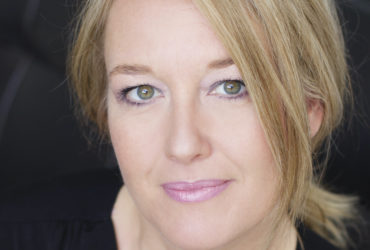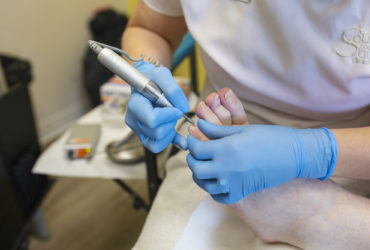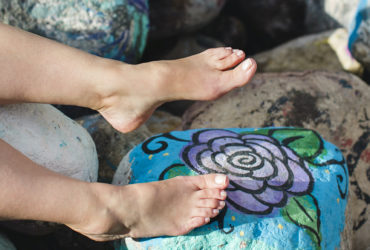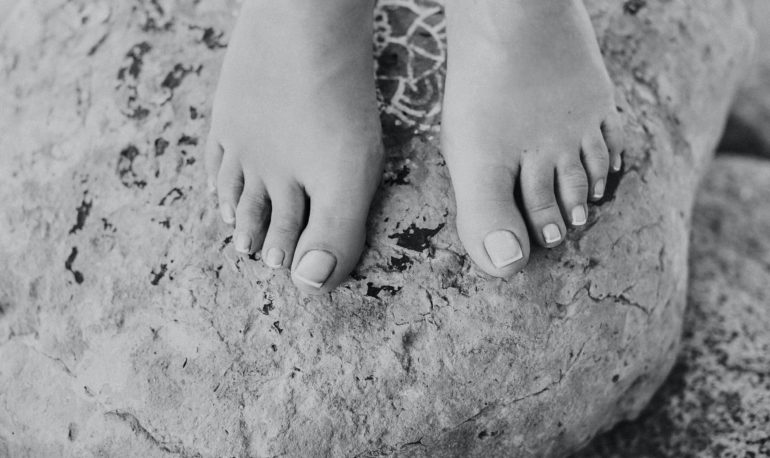Praxis Alum and Podologist Chéri McPhillamey Treats Soles and Reaches Souls

Career and Family Background
The term “mon chéri” means “my dear” in French, a term of endearment that Chéri McPhillamey’s mother used for her husband and so adapted when naming their daughter. It’s a fitting name, since Chéri recalls being guided by her parents to value the diversity and vulnerability of others, instilling in her remarkable empathy for those around her.
As a podologist, Chéri cares for feet, including the skin and nails, for clients “80 to 90% of whom are elderly, on fixed incomes and in declining health.” Some of them have compromised immune systems and so need especially sensitive and gentle treatment. Chéri is one of only two podologists in the province to hold a Bachelor’s degree in the field, from the North American School of Podology (NASP). Other foot care providers have not had access to the high level of education that NASP offers. Chéri works in relation to medical podiatrists (medical foot specialists), “much as a dental hygienist does to a dentist.”
In 2010, as part of her training through the Praxis School of Entrepreneurship, Chéri named her business “Soul to Sole Consulting,” reflecting a philosophy of care with “two passions”: (i) the human foot (including fungal, ingrown or reconstructive nail care) and (ii) the skin of the human foot (including corns and calluses). Treating the sole, Chéri says, allows her “to reach the soul or spirit, that is our Divineness.” Her philosophy is that “when the feet feel good, the soul feels good.”
She further identifies herself as a “passion-based entrepreneur,” loving foot care and wanting to earn a living by it. But since foot care is also a service, Chéri equally identifies as a “mission-based entrepreneur.” She says: “I want to make the world a better place by caring for soles/souls.”
Growing up “in the 70s and 80s” on a farm near Donnelly, in Northern Alberta, Chéri remembers the warmth of her upbringing: Her father, a devoted farrier, would sit “on a bale [of hay]” and teach her “how trimming and treating horses’ hooves” could provide a second life to animals whom others had discarded as “washed up, broken and not good enough.” She found that making the leap to esthetics, and especially footcare, was a natural progression. Chéri adds that she chose this career path in the late 80s and early 90s, when an economic recession meant that few university graduates found jobs. A hands-on career in esthetics made good sense.
Chéri reflects that her father’s respect for animals and for conserving the environment infused his work on the family farm with values “ahead of his time.” Similarly, her mother who was a teacher, respected people’s diversity, and taught, for instance, Indigenous cultures in her classroom long before other people did. She taught Chéri the importance of post-secondary education, to prepare to work with— and value— others’ differences.
Mentorship by Dr. Katharin von Gavel; Earning Multiple Accreditations
Chéri graduated from esthetics training in 1991 and is the first to say that for the next 20 years her career “bounced around,” in a non-linear progression, and saw her move among several Canadian cities before she finally settled in Saskatoon. Early on, she quickly acquired an A-list of celebrities for her esthetics services but felt concern that seniors were in equal need of foot care.
In 1994, Chéri studied with the Toronto-based, internationally renowned, foot care specialist, Dr. Katharin von Gavel, taking intensive workshops on podology that the expert offered as an umbrella to NASP. Chéri says “I learned more [from von Gavel] in a four-day workshop than I had in three years of esthetics training.” But podology is a complex, multi-dimensional field when it comes to training, accreditation and practice. She had sporadically completed many NASP modules while working, and held positions between 1999 and 2009, as a national and international educator and director of education for Light Concept Nails Canada (LCN) and for NASP, positions in esthetics, products and advanced pedicuring.
In 2009, a friend recommended Saskatoon as a home so Chéri relocated here, hoping to develop a serious, full-time podology practice. After living across the country, she has found Saskatoon to be “Canada’s most beautiful city in natural landscape, cultural diversity, its people and the authenticity of [its] energy.” Living with her husband Ed, a self-employed supervisor in the oil and gas industry, and her two stepdaughters, Cheri made Saskatoon her permanent home.
And her training continued, after moving here. Taking a Bachelor’s degree in podology from NASP is a multi-year, “big commitment,” culminating in a complex and intensive residency period on the Caribbean island of St. Kitts. Chéri completed the degree in 2017, assisted by the mentorship of Dr. von Gavel and by the encouragement of Chéri’s husband, Ed.
With the support of another mentor, Chéri also passed the exam of the internationally recognized, prestigious CIDESCO aesthetics therapy program, based on only “three or four weeks” of self-directed study, while its training program usually requires 18 months to complete.
 Along the way, Chéri also earned a valued certificate in Advanced Infection Control, whereby she meets and exceeds Health Canada’s standards for footcare. This is especially crucial to her practice, as seniors often suffer compromised immune systems. By the time Chéri had gained these accreditations, she had long mastered both the practice and theory of podology.
Along the way, Chéri also earned a valued certificate in Advanced Infection Control, whereby she meets and exceeds Health Canada’s standards for footcare. This is especially crucial to her practice, as seniors often suffer compromised immune systems. By the time Chéri had gained these accreditations, she had long mastered both the practice and theory of podology.
Dr. von Gavel remains Chéri’s valued mentor and now collaborator: von Gavel has developed the unique Footlogix line of footcare products, the only pediceutical in the world, meaning it has “pharmaceutical quality ingredients.” And von Gavel has invited Cheri to sell these products, directly from the manufacturer, through “Soul to Sole Consulting.” They will soon become available online, as well, through Cheri’s company website.
Mentorship through the Praxis School of Entrepreneurship
Chéri says that studying entrepreneurship at the Praxis School of Entrepreneurship was another crucial pillar of her success. While she knew podology well, Praxis training was key to turn her from simply “playing” in her practice to operating a serious, full-time business. Frustrated to be (for a short time) on Employment Insurance (EI) when she wanted to work, Chéri went to the Can-Sask Employment Centre to learn how to plan for her business. A career counsellor there recommended the startSMART program and fast-tracked her application, through the EI stream. Chéri then met Elaine Mantyka and within a couple of weeks, the new cohort started. It was “Divinely timed,” Chéri recalls, “being in the right place at the right time.”
She was not intimidated by Praxis’ intensive, nine-month program, saying, “In my mind, we must give 100% and do things ‘right,’ in order to be successful.” Chéri says that she benefited from the emphasis on researching and preparing a solid business plan, because she “had never had a plan” for her practice.
In particular, Chéri recalls that Praxis helped her to achieve a sustainable business, by teaching her the financing and administration of the business. Brent Kreuger and Marie Weinkauf, with “patience and kindness,” taught her to “focus [on] and understand” these areas. Later, Chéri found trusted specialists to whom she now outsources such work.
Praxis’ coaching was excellent, Chéri says, remembering that Elaine was “so brilliant with a gentle style in guiding you. She had a way of asking the right questions that made you think . . . [to] use your critical thinking . . . Elaine pushed me to be better, do better, not settle, with a positive kindness that never felt demeaning or pushed.”
Chéri says that she also “loved how Monica Kreuger (as the owner) was so approachable, open and no-nonsense; she always gave it to you straight. There was no hierarchy; even as the owner, she treated me as an equal, . . . to set me up for success.” Coach Deanna Litz was also “very kind” and brought “a new perspective” to the team.
Chéri observes: “The supportive team/coaches are always there; even after [you] complete the program. . . There’s comfort in knowing that you have an invisible ‘super-hero’ business team in your corner. The team also guides you in being responsible…. for your own decisions; this truly builds your character, commitment and growth.”
From her perspective, Praxis’ reliance on immersion and experiential processes, such as group discussion and practical exercises, in place of book-based learning, far exceeds what other programs offer. For instance, Chéri says that some trades offer apprentice programs, but not in the context of truly realistic practice. So a mechanic-in-training may learn to assemble pieces in a garage, but won’t learn to do so “in pouring rain, with tools missing, having to . . . create temporary fixes and to think way beyond the scope of the problem.” By contrast, Praxis offers this kind of true immersion in one’s business, focusing on how “things can go sideways and you must evolve to handle it.”
Also remarkable to Chéri was that Praxis allows its entrepreneurs to “earn while you learn,” so that she could continue to treat clients, as long as she “kept the income in the business” that she was building. Offering continuous care to previously established clients was essential to Chéri’s success.
Overall, she says of Praxis: “The team is brilliant! . . . Each one of them holds a special place of appreciation in my thoughts and heart.”
Mobile Clinics at Local Pharmacies and Care Facilities
“Soul to Sole Consulting, Inc” opened as a mobile clinic on June 1st, 2010 and Cheri then collaborated with a locally owned pharmacy on 33rd Street. She has not acquired a storefront but continues to collaborate with other pharmacies, care facilities, senior living facilities, and hospitals in the Saskatchewan Health Region. In all these settings, she maintains personal connections with her clients. She works steadily, at least six hours daily, in this mobile clinic, returning calls within one business day. She works intensively and is only interrupted by true emergencies. She says she’s also careful “not to overbook,” because every patient requires her full attention.
In her mobile clinic, Chéri ensures that clients’ issues are reported to the doctor, family, or other care provider, to ensure that proper monitoring occurs, as well as follow-up and treatment. Training and practice have taught her that addressing foot care issues can save lives.
Empathy Shapes Chéri’s Future; Serving Seniors and Remembering Family
Chéri cares deeply about her clients whose needs she feels and meets through empathetic touch and connection. Not only her skills but also that empathetic approach are essential to her practice. She says: “I see things from a different angle than others do . . . I can sense patients’ needs, even if they cannot speak.” She uses body movement, gentle touch and technology to communicate with deaf or hard of hearing clients. In all cases, she establishes a bond with the elderly who are often lonely and missing family and physical contact, especially in pandemic times.
“If you lose a clinic or a patient [for any reason],” she says, “those are hard hits. Or if they move from assisted living to a facility where [foot] care is done by others, it’s a loss.” Chéri mourns these losses, but says that hope returns, as “that [loss] opens room for a new patient who needs you.” For instance, she recently started a contract with a local assisted living facility that is new to her: “When one door closes, another opens.”
While others might dismiss seniors for their limitations, Chéri values these people. “Seniors are living history books,” she emphasizes. “Our culture focuses on museums and statues, but leaves seniors to die in inadequate care facilities, such as in Alberta, Ontario and Quebec,” she says, reflecting recent news during the pandemic.
By contrast, she refers to her “Centennials,” her “100+ year old patients,” as sharing wisdom with her: One patient, a 104-year old woman, explained to Chéri uniquely the secret to success in life: “The past is like a fart: If you stay back there, you get caught in the stink. You need to keep going. Be present!” These clients also appreciate Chéri’s empathy.
When considering the trajectory of her now advanced career, Chéri recalls her first mentors—her parents. Sadly, her mother died 12 years ago. And Chéri greatly misses her father, who passed away recently, due to Covid-19. She grieves that loss and relies on yoga, meditation and her supportive husband to keep going. She also remembers that the Praxis program taught her that in many aspects of life “growth often comes from loss.” She “appreciates this now,” as she recognizes that her late parents’ values live on in her.
Looking back on her mentors and memories, Chéri concludes that the success of her vibrant foot care practice, and the relationships she has built through it, would not have been possible without the invaluable guidance of Praxis’ startSMART program.
 Soul to Sole Consulting, Inc.
Soul to Sole Consulting, Inc.
Owner & Operator: Cheri McPhillamey, B.Sc. (Podology)
(306) 227-7737
soultosole2010@gmail.com
www.soultosole2010.ca


